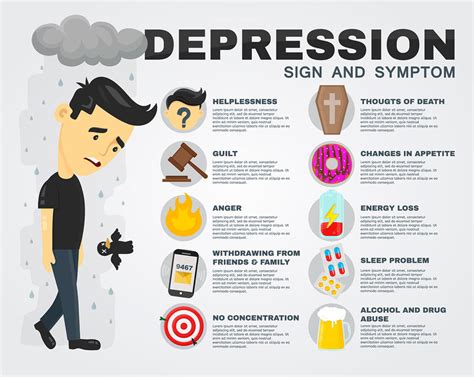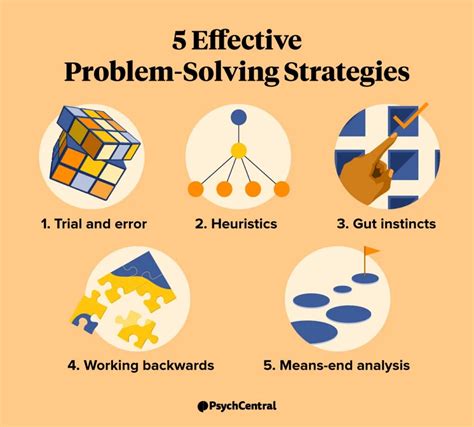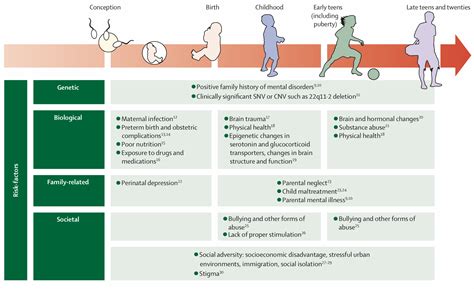Engaging in frequent physical movement can do wonders for not only your body, but also your mind. It may come as a surprise, but staying active on a consistent basis has been found to have remarkable mental benefits that extend far beyond the realm of physical fitness. The connection between exercise and cognitive functioning is a fascinating one, with various scientific studies unveiling the positive impacts regular physical activity can have on our brains. In this article, we will explore the unexpected ways in which exercise can enhance our mental well-being, boost cognitive performance, and improve overall brain health.
One of the most noteworthy advantages of incorporating exercise into your routine is its potential to enhance cognitive abilities. Research has shown that physical activity has a direct impact on the structure and function of the brain, leading to improved memory, sharper focus, and enhanced learning capabilities. By engaging in activities that get your heart rate up, such as aerobic exercises or brisk walking, you stimulate the release of certain hormones and growth factors that promote the growth of new brain cells, strengthen existing connections, and enhance neuroplasticity. These changes in the brain can lead to improved cognitive skills, making it easier for you to concentrate, learn new information, and retain it for longer periods of time.
Moreover, regular exercise has been found to be an effective tool in managing stress and alleviating symptoms of anxiety and depression. This phenomenon can be attributed to the release of endorphins, the brain's feel-good chemicals, during physical activity. Endorphins not only create a sense of euphoria and relaxation but also help to alleviate feelings of anxiety and depression, improving our overall mental state. In addition, engaging in exercise provides a distraction from negative thoughts and emotions, allowing individuals to focus their energy on positive and productive activities. The routine of exercising regularly can also provide a sense of structure and purpose, contributing to a greater sense of mental well-being and self-esteem.
The Transformative Power of Physical Activity on Mental Well-being
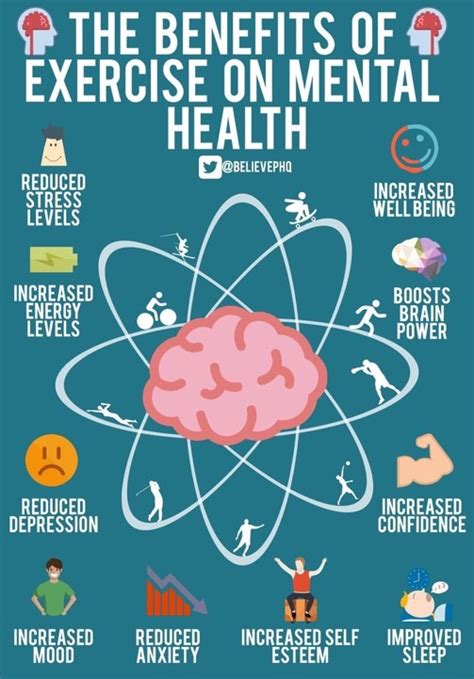
Engaging in regular physical activity can have a remarkable impact on the way we think, feel, and experience life. Research suggests that incorporating physical exercise into our daily routines can lead to profound transformations in our mental well-being and overall quality of life. By exploring the multifaceted effects of physical activity on various aspects of our mental health, we can uncover the immense potential it holds in shaping our emotional resilience, cognitive function, and overall happiness.
A closer examination reveals how physical activity acts as a catalyst for positive change in our mental well-being. Regular exercise has been shown to alleviate symptoms of stress, anxiety, and depression, providing individuals with a powerful means of managing their emotional state. Through the release of endorphins, commonly known as "feel-good" chemicals, exercise contributes to an improved mood and a heightened sense of well-being. Furthermore, physical activity has been found to enhance cognitive abilities, such as memory and attention, which can lead to improved mental clarity and productivity.
In addition to the immediate effects, physical activity also plays a significant role in fostering long-term mental resilience and emotional stability. Engaging in regular exercise has been proven to reduce the risk of developing mental health disorders, such as depression and cognitive decline, later in life. It promotes the growth of new brain cells and strengthens neural connections, leading to improved mental agility and overall cognitive functioning. Moreover, physical activity encourages a sense of self-efficacy and mastery, empowering individuals to overcome challenges and build confidence in their ability to weather life's ups and downs.
It is important to note that the transformative power of physical activity extends beyond the individual. Engaging in physical exercise can enhance social connections and foster a sense of belonging, as it often involves participating in group activities or joining exercise communities. By creating a supportive network of like-minded individuals, physical activity not only improves mental health but also enables individuals to find solace and build meaningful relationships, further enhancing overall well-being.
| Key Benefits: |
|---|
| 1. Enhanced emotional resilience |
| 2. Improved cognitive function |
| 3. Reduced risk of mental health disorders |
| 4. Increased self-efficacy and confidence |
| 5. Enhanced social connections |
Boosting Brain Function through Exercise: Uncovering the Connection
Enhancing cognitive abilities and improving brain function are just some of the remarkable outcomes that arise from engaging in physical activities. Exploring the intricate relationship between exercise and brain health reveals compelling evidence demonstrating the multitude of ways exercise positively impacts cognitive performance and overall brain function.
1. Cognitive Enhancement
- Elevates cognitive abilities by stimulating neural connections and promoting neuroplasticity.
- Facilitates better memory retention and recall through increased blood flow and oxygen supply to the brain.
- Improves focus, attention, and concentration, boosting overall cognitive performance.
- Promotes efficient information processing and enhanced problem-solving skills.
2. Emotional Well-being
- Fosters the release of endorphins, neurotransmitters that induce feelings of pleasure and happiness.
- Reduces stress, anxiety, and depression by regulating the production of stress hormones.
- Enhances self-esteem and self-confidence, contributing to a positive mindset and improved emotional well-being.
- Provides a natural outlet for emotional release, aiding in the management of mood disorders.
3. Neuroprotective Effects
- Reduces the risk of age-related cognitive decline and neurodegenerative diseases, such as Alzheimer's and Parkinson's.
- Stimulates the production of neurotrophic factors, facilitating the growth and survival of brain cells.
- Improves overall brain health by enhancing the function of the hippocampus, a vital region for memory formation.
- Mitigates the effects of neurotoxic substances and free radicals through increased antioxidant activity.
By uncovering the intricate connection between exercise and brain function, individuals can harness the power of physical activity to optimize cognitive performance, support emotional well-being, and protect their brain health. Incorporating regular exercise into one's lifestyle can unlock a host of benefits that extend far beyond the physical realm.
Anxiety and Depression: How Consistent Physical Activity Can Make a Profound Impact
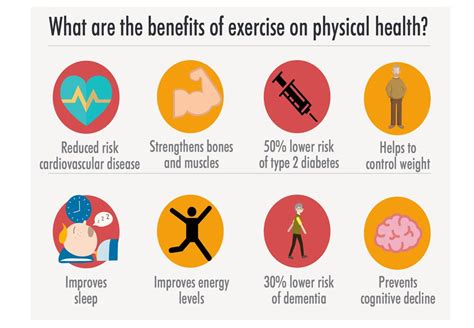
When it comes to alleviating anxiety and depression, there is a powerful tool at our disposal that often goes unnoticed: consistent engagement in physical activity. In the realm of mental health, the link between regular exercise and positive emotional well-being is truly remarkable. By embracing a variety of synonyms for commonly used words and phrases, we can better comprehend the transformative effects that ongoing physical movement can have on the mind.
Anxiety Relief: Embracing a routine of regular physical exercise can significantly contribute to reducing feelings of unease, apprehension, and worry. Consistently engaging in varied physical activities not only supports the body's ability to manage stress, but also promotes a sense of calmness and tranquility. The act of moving one's body has the potential to result in a decreased tendency to feel overwhelmed or consumed by anxious thoughts, ultimately leading to a more balanced mental state.
Depression Management: Implementing a consistent exercise regimen can play a pivotal role in managing the effects of depression. By actively participating in physical activities, an individual can experience an improved mood, increased energy levels, and enhanced overall well-being. The regular release of endorphins through exercise serves as a natural mood booster, producing a sense of happiness and contentment. In conjunction with other treatment methods, exercise can become a valuable component in combating the symptoms of depression.
The Mind-Body Connection: The connection between physical activity and mental health is not solely limited to isolated effects on anxiety or depression. Engaging in regular exercise supports the overall mind-body connection, promoting holistic well-being. Exercise encourages self-confidence, self-discipline, and resilience, all of which are vital in maintaining a positive mental state. The physical exertion involved in regular exercise enhances cognitive function, increases focus, and fosters mental clarity, allowing individuals to better navigate the challenges of daily life.
In conclusion, embracing and consistently engaging in physical activity can have a profound impact on the management of anxiety and depression. By incorporating a variety of synonyms in discussing the benefits of exercise, we can more fully comprehend the transformative power that persistent physical movement has on mental well-being. As individuals prioritize regular exercise as a part of their overall self-care routine, they open the door to a world of positive change, inviting calmness, happiness, and improved mental health.
Exercise as a Natural Antidepressant: Understanding the Science
In this section, we will explore the fascinating connection between physical activity and its impact on mental well-being. Rather than solely relying on traditional treatment methods, consider harnessing the power of exercise as a natural remedy for depression.
- Exercise, synonymously referred to as physical activity, can serve as an effective mood booster.
- Through the release of endorphins, commonly known as the "feel-good" chemicals, physical exertion has the potential to alleviate symptoms of depression.
- Research indicates that engaging in regular exercise may regulate the neurotransmitters in the brain associated with mood, leading to an overall improvement in mental health.
- In addition to neurotransmitter regulation, exercise can stimulate the growth of new neurons and enhance brain connectivity, promoting a more positive outlook on life.
- Moreover, the act of exercising often provides a sense of accomplishment and self-esteem, counteracting feelings of worthlessness often experienced by those with depression.
- Furthermore, exercise fosters social interaction, which can combat feelings of isolation and loneliness commonly associated with mental health conditions.
- While exercise should not replace medical intervention for severe depression, it can serve as a supplement to conventional treatments and enhance their effectiveness.
As we delve deeper into the science behind exercise as a natural antidepressant, it becomes evident that integrating physical activity into one's daily routine can yield numerous mental health benefits. By understanding the mechanisms through which exercise positively affects our minds, we can take proactive steps towards improving our overall well-being.
Overcoming Stress and Promoting Emotional Well-being with Physical Activity
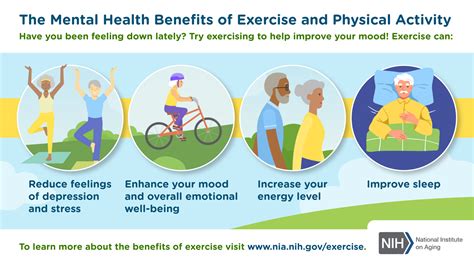
Discover the transformative power of incorporating physical activity into your daily routine for reducing stress and enhancing emotional well-being. Delve into the remarkable ways in which engaging in regular exercise can help you effectively manage the pressures of modern life and cultivate a positive mindset.
Harnessing the Therapeutic Potential of Physical Activity for Mental Disorders
Exploring the manifold ways in which physical activity can be utilized as a powerful tool in addressing mental disorders, this section aims to shed light on the untapped potential and immense benefits that exercise can offer to individuals struggling with various mental health conditions. By harnessing the therapeutic properties of physical activity, individuals can find significant improvements in their overall well-being, cognitive functioning, and emotional stability.
1. Promoting Stress Relief: Physical activity can serve as a robust mechanism to alleviate and manage stress, a common culprit in many mental disorders. Engaging in regular workouts can activate the body's natural stress response system, releasing endorphins and providing an outlet for pent-up tension and anxiety.
2. Enhancing Cognitive Function: Research has indicated that physical activity can significantly improve cognitive function, including memory, attention, and problem-solving abilities. By increasing blood flow to the brain and promoting the growth of new neurons, exercise serves as a powerful means to prevent or alleviate cognitive decline associated with mental disorders.
3. Fostering Social Connections: Participating in group exercise activities or sports can facilitate social interactions, reducing feelings of loneliness and isolation commonly experienced by individuals with mental disorders. The sense of community and camaraderie stemming from shared physical activities can provide emotional support and a sense of belonging.
4. Regulating Mood and Emotions: Physical activity has been found to regulate mood and emotions, playing a pivotal role in managing symptoms of depression, anxiety, and bipolar disorder. The release of endorphins during exercise can elevate mood, reduce feelings of sadness and anxiety, and promote an overall sense of well-being and relaxation.
5. Boosting Self-esteem and Confidence: Engaging in regular physical activity can improve self-esteem and boost confidence levels, which are often compromised by mental disorders. Accomplishing fitness goals, acquiring physical strength, and witnessing personal progress can greatly enhance self-perception and resilience in individuals struggling with mental health challenges.
With these remarkable therapeutic benefits in mind, it becomes evident that exercise is not just a means to stay physically healthy but also a powerful treatment modality for mental disorders. By incorporating regular physical activity into mental health treatment plans, healthcare professionals can harness its immense potential to improve the lives of individuals grappling with various mental health conditions.
Improving Self-Esteem and Body Image through Consistent Physical Activity
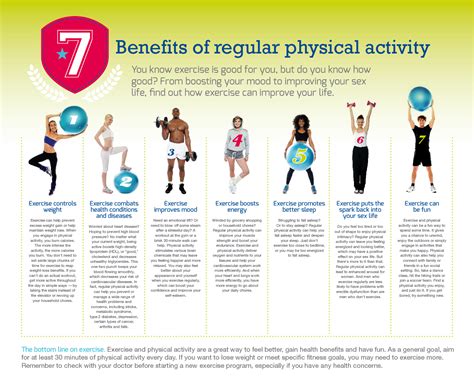
Elevating confidence and nurturing a positive perception of oneself and one's physical appearance can be achieved through incorporating regular exercise into one's lifestyle. Engaging in physical activity on a consistent basis promotes a sense of self-worth and enhances body image. By participating in activities that increase strength, flexibility, and overall fitness, individuals can develop a greater appreciation for their bodies and a more positive attitude towards themselves.
1. Building Strength and Resilience: Consistent physical exercise allows individuals to challenge their physical limits and push beyond their comfort zones. As they witness their bodies becoming stronger and adapting to new challenges, their self-esteem naturally improves. By achieving personal fitness goals and building physical strength, individuals can develop a newfound sense of empowerment and self-confidence.
2. Enhancing Body Image: Regular physical activity can help reshape one's perception of their body. As individuals focus on the functionality and capabilities of their bodies rather than solely on appearance, self-image begins to shift in a positive direction. Engaging in exercise not only improves physical fitness, but it also encourages individuals to embrace their body's unique abilities and develop a more holistic understanding of beauty.
3. Boosting Mood and Reducing Stress: Exercise has been shown to stimulate the release of endorphins, commonly known as "feel-good" hormones, which can significantly impact one's emotional well-being. Regular physical activity reduces stress levels, alleviates symptoms of anxiety and depression, and improves overall mental health. As individuals experience the positive effects of exercise on their mood and emotional state, their self-esteem naturally grows.
4. Cultivating a Supportive Community: Engaging in exercise often involves joining fitness communities and participating in group activities. Surrounding oneself with like-minded individuals who share similar goals and experiences provides a valuable support system. This sense of community fosters a supportive environment, encouraging individuals to embrace their journey and celebrate their achievements, ultimately nurturing a positive self-image.
By recognizing the transformative impact of regular physical activity on self-esteem and body image, individuals can prioritize incorporating exercise into their daily routines. By doing so, they can unlock the powerful mental health benefits that come hand in hand with an active lifestyle.
Exercise as a Potent Stress-Busting Tool: Techniques and Tips
Engaging in regular physical activity goes far beyond improving your physical well-being. It also holds immense potential as a formidable strategy for managing the overwhelming burden of stress. This section will delve into the various tried-and-true techniques and invaluable tips that harness the power of exercise to combat stress effectively.
One technique that has proven effective in utilizing exercise as a stress-management tool is practicing mindfulness while engaging in physical activity. By immersing yourself completely in the present moment and focusing on the sensations of your body, you can experience a profound sense of relaxation and release from stress. This can be achieved by paying close attention to the rhythm of your breath, the sound of your footsteps, or the feel of your muscles as you exercise.
Another helpful technique to consider is incorporating high-intensity interval training (HIIT) into your exercise routine. HIIT involves short bursts of intense physical exertion followed by brief recovery periods. Not only does it offer an efficient way to burn calories, but it also stimulates the release of endorphins, those feel-good chemicals in the brain that can counteract stress and elevate mood.
In addition to specific techniques, there are several general tips to keep in mind when using exercise as a stress-management tool. First and foremost, it is crucial to find a type of physical activity that you genuinely enjoy. Engaging in something that brings you pleasure will make it easier to stick with and derive the greatest benefits from. Furthermore, setting realistic goals and gradually increasing the intensity or duration of your exercise sessions can help prevent feelings of frustration or burnout.
A valuable tip to remember is to be consistent with your exercise routine. Regular physical activity, whether it's a brisk walk, a yoga class, or a session in the gym, can help establish a sense of structure and routine in your daily life, providing a reliable outlet for stress relief. Lastly, don't underestimate the power of social support. Exercising with a friend, joining a sports team, or taking part in group fitness classes can not only enhance the enjoyment of exercise but also provide an invaluable source of encouragement and connection, reducing feelings of stress and isolation.
| Techniques | Tips |
|---|---|
| 1. Mindfulness | 1. Find an activity you enjoy |
| 2. High-intensity interval training | 2. Set realistic goals |
| 3. Consistency is key | |
| 4. Seek social support |
Enhancing Cognitive Abilities and Preventing Mental Decline: The Exercise Effect
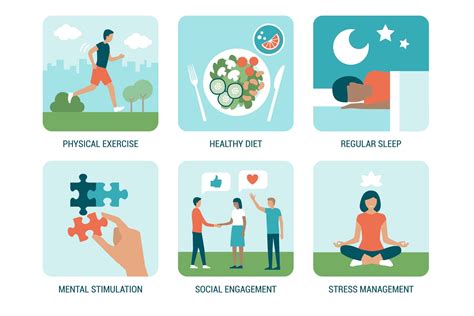
In this section, we explore the impact of engaging in regular physical activity on cognitive abilities and the prevention of mental decline. Through exercise, individuals can enhance their cognitive function and protect against the decline associated with aging and certain mental health conditions.
- Exercise stimulates the brain:
- Improved memory and attention:
- Reduced risk of cognitive decline and dementia:
- Enhanced creativity and problem-solving:
- Boosted mood and mental well-being:
- Promotion of neuroplasticity:
- Management of stress and anxiety:
- Prevention of age-related cognitive decline:
- Support for mental health conditions:
Overall, regular exercise serves as a powerful tool for enhancing cognitive abilities, promoting brain health, and preventing mental decline. Through various mechanisms, physical activity positively influences the brain, leading to improved memory, attention, creativity, and problem-solving skills. Additionally, exercise has been shown to reduce the risk of cognitive decline, dementia, and various mental health conditions. By managing stress and promoting neuroplasticity, exercise contributes to overall mental well-being and supports healthy aging.
Exercise as a Pillar of Emotional Resilience: Building Mental Strength
In the realm of emotional well-being, the role of exercise cannot be overstated. By incorporating physical activity into our daily routine, we can enhance our ability to withstand and recover from emotional challenges. Exercise serves as a strong foundation for nurturing mental strength, allowing us to better navigate the complexities of life.
Emotional Resilience: The capacity to adapt and bounce back from adversity, emotional resilience is a fundamental aspect of mental well-being. Engaging in regular exercise acts as a catalyst, strengthening our resilience and building a solid framework for emotional stability. As we push our physical limits, we develop a unique resilience mindset that extends to our emotional fortitude.
Stress Reduction: In a world filled with stressors, exercise serves as a powerful stress-relief tool. When we engage in physical activity, our bodies release endorphins - "feel-good" hormones that alleviate stress and boost our mood. By regularly participating in exercise, we cultivate a healthy outlet for stress and develop resilience against its negative effects.
Improved Self-esteem: Physical activity can significantly enhance our self-esteem and self-worth. As we set and achieve fitness goals, we build confidence in our abilities both inside and outside of the gym. This newfound self-belief translates into increased emotional resilience, empowering us to overcome challenges and face adversity head-on.
Enhanced Cognitive Function: Exercise has a profound impact on our cognitive function and mental clarity. By increasing blood flow to the brain, physical activity improves our focus, memory, and overall mental sharpness. These cognitive benefits not only contribute to emotional resilience but also help us to develop effective coping strategies and problem-solving skills.
Community Support: Engaging in regular exercise often involves joining fitness groups or classes, creating opportunities for social interactions and community support. This sense of belonging and connection can have a profound impact on our mental well-being. By surrounding ourselves with like-minded individuals, we create a network of support that bolsters our emotional resilience and provides a sense of camaraderie.
Conclusion: Exercise is a critical pillar of emotional resilience, enabling individuals to build mental strength and navigate the ups and downs of life with greater ease. By incorporating physical activity into our daily routine, we can harness the numerous benefits that exercise provides, fostering emotional well-being and empowering ourselves to thrive.
The Mind-Body Connection: Supporting Overall Mental Well-being through Physical Activity
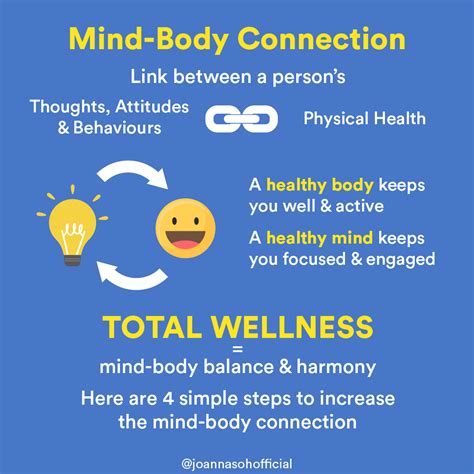
In this section, we will explore the intricate relationship between the mind and the body, shedding light on how engaging in regular physical activities can contribute to enhancing mental health holistically.
Exercise plays a pivotal role in promoting psychological well-being, fostering a deeper connection between the mind and body. By partaking in physical activities, individuals can experience a range of positive effects that extend far beyond the physical realm. Engaging in regular exercise routines stimulates the release of endorphins, known as the "feel-good" hormones, which help alleviate feelings of stress, anxiety, and depression.
Moreover, physical activity also helps regulate the production of neurotransmitters, such as serotonin and dopamine, which are essential for maintaining a balanced mood and improving overall mental health. By establishing a consistent exercise regime, individuals can boost their self-esteem, increase their energy levels, and enhance their ability to cope with daily challenges.
| Physical Benefits | Mental Benefits |
| - Improved cardiovascular health | - Reduced symptoms of anxiety and depression |
| - Strengthened immune system | - Enhanced cognitive function |
| - Increased flexibility and endurance | - Alleviated stress levels |
| - Weight management and muscle toning | - Enhanced self-confidence |
Furthermore, exercise provides individuals with an opportunity to engage in mindfulness and improve their mental clarity. Whether practicing yoga, meditation, or simply going for a run in nature, physical activity can serve as a form of mental escape, allowing individuals to reduce mental clutter, concentrate on the present moment, and promote a sense of inner peace. Additionally, the social aspect of exercising, such as joining group fitness classes or participating in team sports, can foster a supportive community, alleviate feelings of loneliness, and enhance overall mental well-being.
FAQ
How does regular exercise impact mental health?
Regular exercise has numerous positive effects on mental health. It can help reduce symptoms of anxiety and depression, boost mood and self-esteem, improve sleep, and enhance overall cognitive function.
How often should I exercise to see mental health benefits?
The frequency of exercise needed to see mental health benefits can vary from person to person. However, experts generally recommend aiming for at least 150 minutes of moderate-intensity exercise or 75 minutes of vigorous-intensity exercise per week, spread out over several days.
What types of exercise are most effective for improving mental health?
Various types of exercise can be effective for improving mental health. Aerobic exercises, such as running, swimming, or cycling, have been shown to have significant benefits. Additionally, activities like yoga and mindfulness-based exercises that focus on both physical movement and mental relaxation can also be highly beneficial.
Can exercise help with anger management?
Yes, exercise can be a useful tool for anger management. Engaging in physical activity helps release tension and pent-up emotions, reducing the likelihood of explosive anger episodes. Regular exercise can also improve mood regulation and overall emotional well-being.
Are the mental health benefits of exercise long-term or just temporary?
The mental health benefits of exercise can be both short-term and long-term. In the short term, exercise releases endorphins, which immediately boost mood and provide a sense of well-being. Long-term exercise has been shown to have lasting effects on mental health, improving symptoms of anxiety and depression, increasing resilience to stress, and promoting overall emotional stability.
